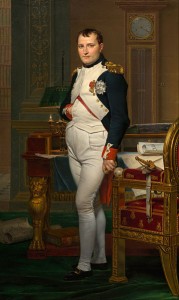
The Emperor Napoleon in His Study at the Tuileries. jacques-Louis David, 1812. [Source]
Dzhokhar Tsarnaev, the surviving Boston marathon bomber, will be tried as a civilian and not as an enemy combatant. Tsarnaev is an American citizen, but he’s also a suspected terrorist – hence debate over the mode of trial, and a related controversy over his Miranda rights. We tend to reflexively identify terrorists as international operatives, despite instances of (and increasing anxiety over) “homegrown” terrorists. But what we call homegrown terrorism – plotting within a target nation – is in fact somewhat closer to the original English use of the word, which dates from the eighteenth century, and which was coined to describe the (potentially violent) thwarting of political participation.
“Terrorist” first entered the English language in Edmund Burke’s Letters on a Regicide Peace, written and published throughout 1795 and 1796 –the politician and philosopher’s extended argument against England ending its war with France, and his last reaction to the French Revolution. It came directly from the French “terroriste” and “terrorisme,” both of which came into use in 1794, during the most violent phase of the Revolution. The French Constitution of 1795 had been widely opposed; riots were put down by a young Napoleon Bonaparte. “Twenty thousand regular Troops garrison Paris,” wrote Burke. “Thus a complete Military Government is formed…To secure them further, they have a strong corps of irregulars, ready armed. Thousands of those Hell-hounds called Terrorists…are let loose on the people.” He concluded: “The whole of their Government, in its origination, in its continuance, in all its actions, and in all its resources, is force; and nothing but force.”
Terrorism here is associated with government coercion, with wielding illegitimate power – illegitimate because it had no consent from the people: “This year’s Constitution…is the only one which in its very formation has been generally resisted… It never had a popular choice even in show.”
Burke’s usage was echoed by Jeremy Bentham some twenty years later in his Plan of Parliamentary Reform. Bentham listed “the Terrorist” as a figure “by whom freedom of suffrage is destroyed…The terrorist is he who obtains his seat by the motive of fear…he who repels, quells, subdues, or excludes any competitor.” For Bentham, too, terrorism represented a perversion of the political process.
In this emphasis on the nature of unsanctioned power, however, we can see that the emotional resonance of the word was the same then as now: unpredictability, violence, and fear.

As you observe, Burke borrows from the French usage. And as one might expect, he finds congenial a label which has a deep core of social prejudice running through it. The vocabulary of ‘terrorism’ and ‘terrorist’ was used after the fall of Robespierre by the French national political elite to distance themselves from their real complicity in preceding events, creating instead an assertion that members of the ‘lower orders’ had held them hostage [in some undefinable, metaphysical sense], and forced them to run the country by force and fear.
This notion of the bloodthirsty common man, preying on established society, was what Burke had been saying about the French revolutionaries and their English sympathisers ever since his Reflections of 1790. He was working to defend an established order – which he of course viewed very much as the best of all possible worlds – against popular sovereignty, as espoused by the persecuted, yet still dreaded, followers of his former friend and now great ideological opponent, Thomas Paine.